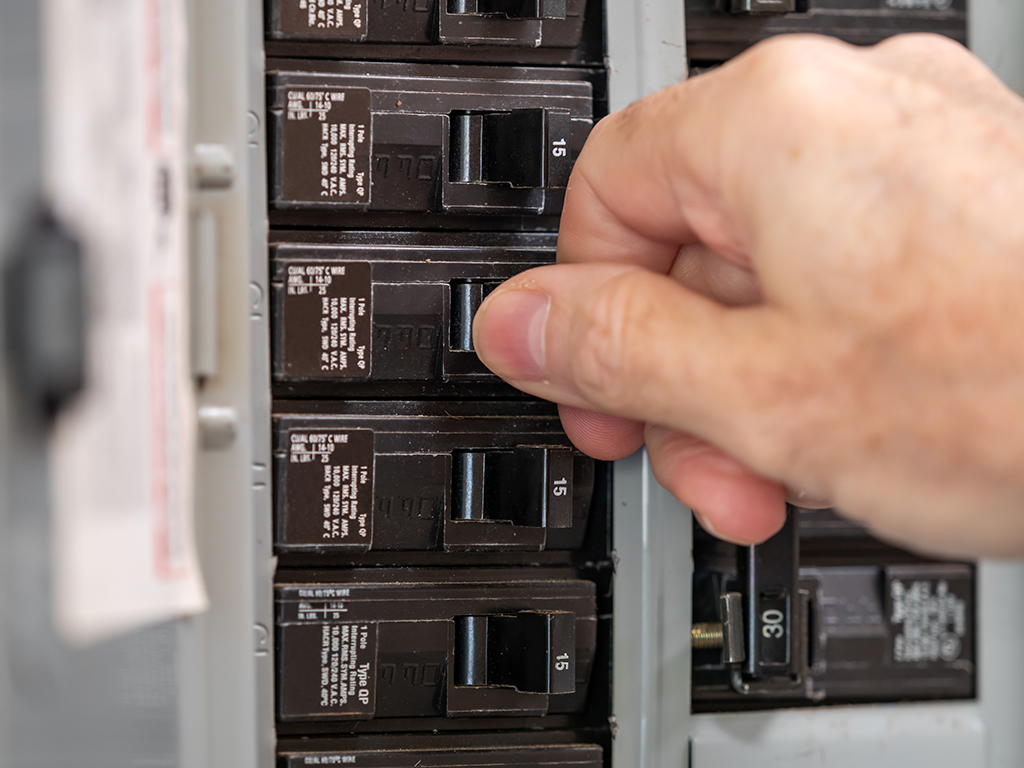
Reasons You Should Call A Local Electrician | Wilmington, NC
Photo By The Toidi at Shutterstock
The electrical system is one of, if not the most, important aspects of a home in Wilmington, NC. Handling electricity is a little different than most home maintenance and repairs. A broken pipe or backed-up drain can cause extensive water damage and create an unhealthy environment without prompt action. Plumbing issues rarely present a life-threatening risk to a household, but an electrical problem can result in a potentially fatal shock or start a fire. Consulting a professional electrician is the safest way to manage electrical issues.
Circuit Breakers
Tripped circuit breakers are a common problem. This can happen when the circuit breaker finds a problem with a connection. Although it can be irritating, a tripped circuit breaker is actually working exactly as intended. It’s a safety measure that halts the flow of electrical current to prevent overload. Circuit breakers should trip automatically if a problem arises, but they can also be tripped manually.
Frequent breaker trips are a sign that something isn’t right. It could be a relatively minor problem such as using too many large appliances at once. Distributing appliances to different circuits or using appliances at staggered times may help avoid overloaded circuits. If these solutions aren’t effective, it’s time to call an electrician.
Unsecured Outlets
Open electrical outlets can be risky in homes with children. A child may try to explore outlets or push something into them. A basic cover blocks access to outlets until it’s removed when an outlet is needed.
Sliding receptacles also cover outlets, but they are designed to slide to the side to plug something in. Tamper-resistant receptacles block outlet openings with spring-loaded covers. Pushing a plug into place compresses both springs at once, which is necessary to open the outlet. A child pushing on only one side or applying uneven pressure won’t engage both springs.
Loose Contacts
Sometimes plugs fall out of outlets. This is an irritating problem, but it may have a simple solution. Try several devices to make sure the problem is in the receptacle instead of the prongs on a plug. Damaged and loose contact points are the most frequent cause of loose outlets. Contacts inside electrical outlets loosen over time. The unit needs to be replaced when this happens because contacts can’t be repaired. It’s best to call a professional to make sure new outlets are installed correctly. Incorrect installation can lead to many problems in the future.
Burnt Outlets
A malfunctioning outlet could also be burnt. A short circuit occurs when outlets overheat and melt surrounding insulation and exposed wiring. Sparks occur in and around outlets frequently when something is plugged in. They’re usually harmless, but some sparks cause burnouts.
The spark itself probably won’t be noticed, but it can char and blacken the edges around the socket. Warm spots may be felt on the outlet itself or on the surrounding wall. Stop using a burnt outlet immediately and contact your local electrician as soon as possible. Electric lines in Wilmington, NC, can carry up to 240 volts, and a spark can start a house fire in very little time.
Electrical Panels
Modern electrical panels were initially installed in the 1960s, which means older homes may have outdated and potentially unsafe panels. Overloaded panels and panels in poor condition can start fires. A panel should be replaced every 20 to 30 years. Your electrician can figure out how old an electrical panel is by examining the serial number and other identifying features to determine the manufacturer. If the panel isn’t safe. An electrician can also install a new panel, although this may require upgrades throughout the electrical system.
Outlets Near Water
Many homes have electrical outlets near water sources in bathrooms, kitchens, and basements. Although outlets near water are common, the situation isn’t ideal. Outlets should be far from water to reduce the risk of accidental splashes or drips. Sometimes it’s possible to relocate outlets. Consult your local electrician to find out if reconfiguring outlets in your home is feasible.
If an outlet near water isn’t avoidable, take proper safety precautions. Do not touch an outlet or plug something in with wet hands and make sure the surface of the outlet is dry. Your hands should be dry before turning appliances and devices on and off as well. Try not to run water while you’re using a nearby outlet. Unplug small appliances and electrical tools or devices as soon as you’re finished and store everything properly.
GFCI
A device called a GFCI, or ground fault circuit interrupter reduces the risk of accidents when water touches an outlet. The Electrical Safety Foundation International believes GFCI devices contributed to a significant drop in electrocutions from 481 in 1968 to only 30 in 2015.
A GFCI monitors current on ungrounded and grounded conductors. Any discrepancy between conductors trips the device and stops the flow of electrical current. The device can be reset easily because the buttons are all present on the outlet itself. If your outlets aren’t equipped with GFCI devices, an electrician can install them for you.
Electrical Emergencies
Call emergency services and an electrician and if an electrical emergency occurs. Homeowners can take safety precautions while waiting for help to arrive. In case of fire, use a fire extinguisher. Never pour water on electrical fires.
If someone in the home experiences an electric shock, use a wooden stick or other items that don’t conduct electricity. Touching the affected person could result in a second person being shocked. Cut the electrical current to the entire house, if possible, during any electrical emergency.
Call Mister Sparky of Wilmington in Wilmington, NC, for any questions or concerns regarding your home’s electrical system. Experienced licensed electricians can help you with everything from an inspection and maintenance to repairs, upgrades, or rewiring.

